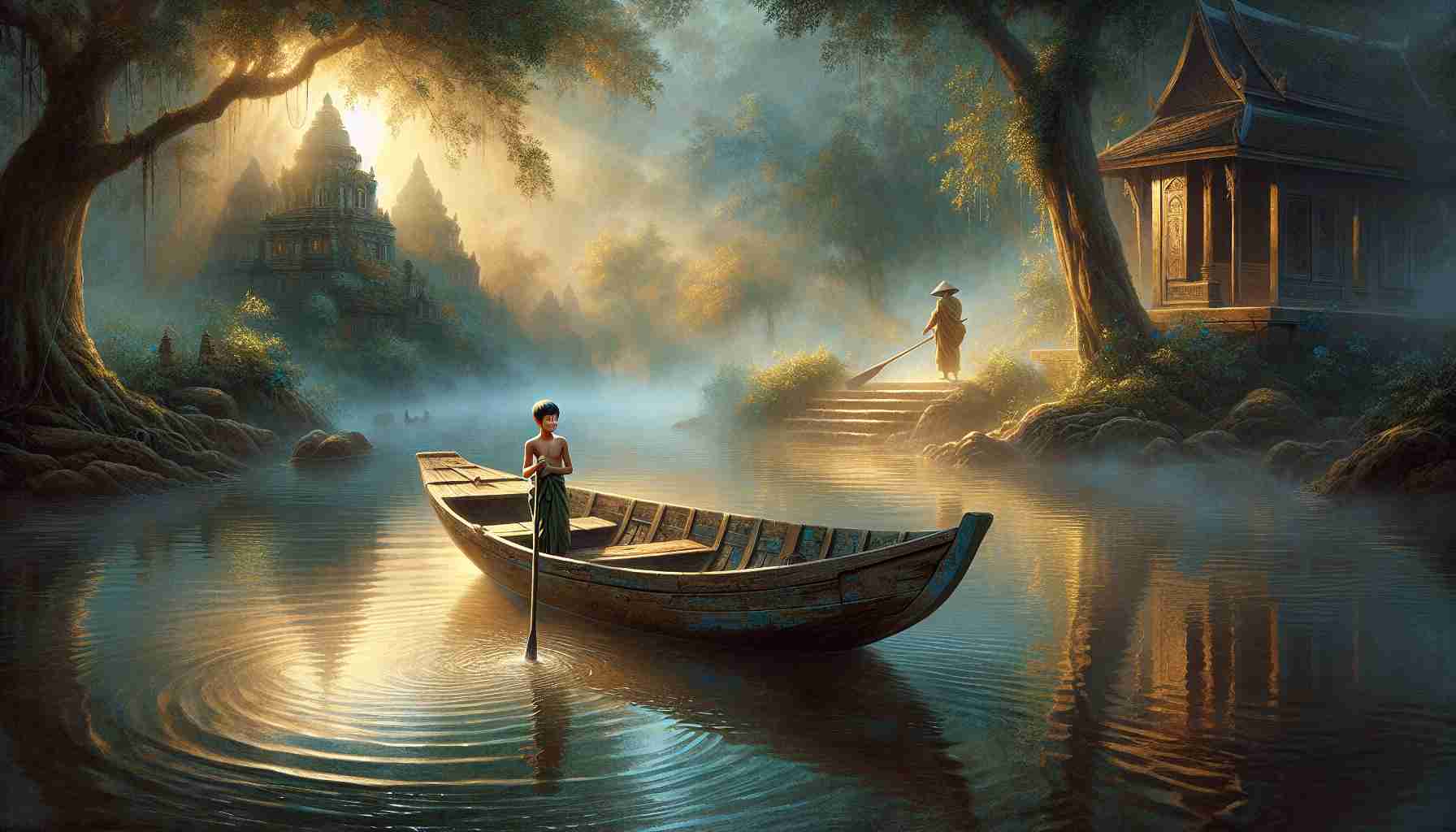

I was just a ferry boy on the river—not strong, not clever, just quiet. Every day, I rowed people from one side to the other in a small, creaky wooden boat. People never noticed me, and that was fine. But one day, something happened that I’d never forget.
The river was misty that morning, the kind of mist that makes the world feel hushed. I was halfway across when I saw it—a little empty boat drifting slowly downstream. There was no one inside. Just an empty vessel, gently floating on the water.
At first, I didn't think much of it, until another boatman nearby started yelling. His boat bumped into the empty one. “Who left this boat here?!” he shouted, furious. He turned red and kicked the side of his boat. But there was no one to blame.
I watched in silence. It all seemed silly—so much anger at a boat that had no intention, no direction, no person steering it. It just floated with the river.
That evening, I sat with Old Pai, a retired monk who now spent his days sweeping the temple steps near the river. “Why did that man get so angry today?” I asked. “It was just an empty boat.”
Old Pai nodded slowly. “That boat teaches a lesson,” he said.
I blinked. “A lesson?”
“Yes,” he smiled. “Master Zhuangzi, a great Taoist thinker long ago, told a story just like today’s. A man rowing a boat is calm—until another boat rams him. If someone is inside, he yells. But if the boat is empty, he stays quiet. Why? Because there's no one to blame.”
I wrinkled my forehead, trying to understand.
Old Pai went on, “When we believe someone means to hurt us, we get angry. But much of life is like the empty boat. Things happen. The wind blows. People shout. Boats bump. But not everything happens with a purpose to hurt us. The Tao teaches us to float like the empty boat—to go with the flow, to not push or pull too much.”
“So... we get angry because we think things are aimed at us?” I asked slowly.
Old Pai nodded. “But when we understand that life flows like the river, we stop fighting it. That is Wu Wei—non-action. Not lazy, but gentle. Simple.”
That night, as stars blinked over the quiet river, I thought about that empty boat. It didn’t fight the current or care where it went. It didn’t hold anger or fear. It was just... there.
Weeks passed, and I noticed things. When people shouted, I didn’t shout back. When it rained, I didn’t sulk. I just kept rowing—easy and calm.
I didn’t change overnight. But now, when something bumps into my day, I remember the empty boat. And I breathe. And float.
That’s how I started finding peace—not by doing more, but by feeling less pulled around inside. And I think that is the Way of Tao.
I was just a ferry boy on the river—not strong, not clever, just quiet. Every day, I rowed people from one side to the other in a small, creaky wooden boat. People never noticed me, and that was fine. But one day, something happened that I’d never forget.
The river was misty that morning, the kind of mist that makes the world feel hushed. I was halfway across when I saw it—a little empty boat drifting slowly downstream. There was no one inside. Just an empty vessel, gently floating on the water.
At first, I didn't think much of it, until another boatman nearby started yelling. His boat bumped into the empty one. “Who left this boat here?!” he shouted, furious. He turned red and kicked the side of his boat. But there was no one to blame.
I watched in silence. It all seemed silly—so much anger at a boat that had no intention, no direction, no person steering it. It just floated with the river.
That evening, I sat with Old Pai, a retired monk who now spent his days sweeping the temple steps near the river. “Why did that man get so angry today?” I asked. “It was just an empty boat.”
Old Pai nodded slowly. “That boat teaches a lesson,” he said.
I blinked. “A lesson?”
“Yes,” he smiled. “Master Zhuangzi, a great Taoist thinker long ago, told a story just like today’s. A man rowing a boat is calm—until another boat rams him. If someone is inside, he yells. But if the boat is empty, he stays quiet. Why? Because there's no one to blame.”
I wrinkled my forehead, trying to understand.
Old Pai went on, “When we believe someone means to hurt us, we get angry. But much of life is like the empty boat. Things happen. The wind blows. People shout. Boats bump. But not everything happens with a purpose to hurt us. The Tao teaches us to float like the empty boat—to go with the flow, to not push or pull too much.”
“So... we get angry because we think things are aimed at us?” I asked slowly.
Old Pai nodded. “But when we understand that life flows like the river, we stop fighting it. That is Wu Wei—non-action. Not lazy, but gentle. Simple.”
That night, as stars blinked over the quiet river, I thought about that empty boat. It didn’t fight the current or care where it went. It didn’t hold anger or fear. It was just... there.
Weeks passed, and I noticed things. When people shouted, I didn’t shout back. When it rained, I didn’t sulk. I just kept rowing—easy and calm.
I didn’t change overnight. But now, when something bumps into my day, I remember the empty boat. And I breathe. And float.
That’s how I started finding peace—not by doing more, but by feeling less pulled around inside. And I think that is the Way of Tao.